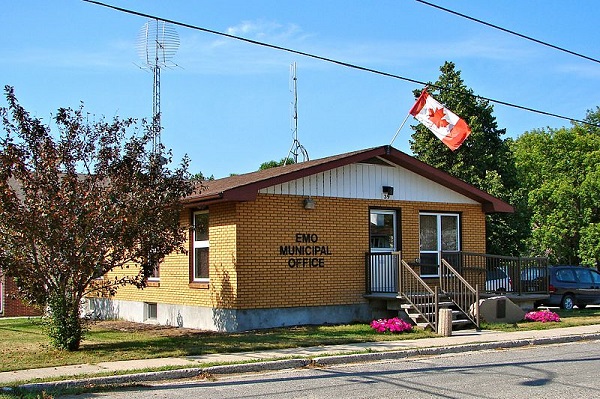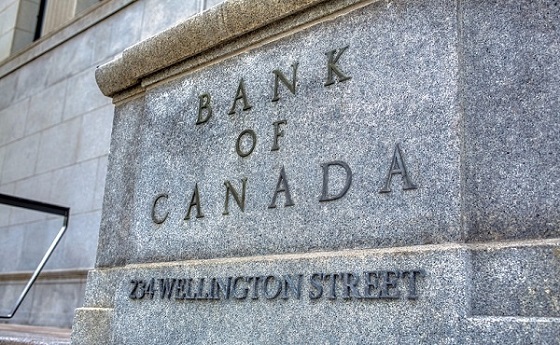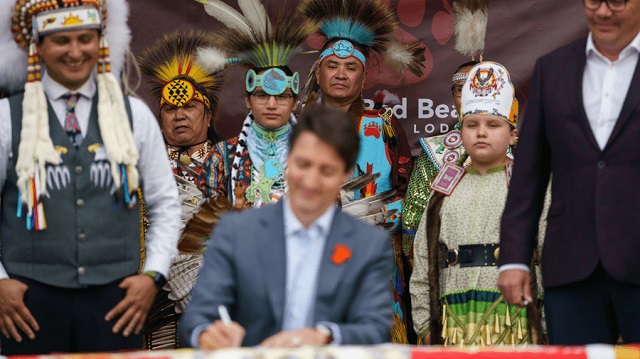National
Canadian mayor has bank account garnished after standing up to LGBT activists

From LifeSiteNews
The garnishment was issued by the court and delivered to the CIBC in Emo, which is the only bank in that community.
LGBT activists aren’t used to politicians refusing to do what they say. That’s why Mayor Harold McQuaker of Emo, Ontario—population 1,200—has become a source of their ire.
As I reported previously, in 2020 Emo’s town council voted not to issue a “Pride Proclamation” or fly the LGBT flag. The town hall doesn’t even have a flagpole. In response, Borderland Pride sued the town, and last month the Ontario Human Rights Commission ordered the township to pay the LGBT group $10,000, and McQuaker was ordered to personally pay $5,000 and take a re-education class called “Human Rights 101.”
The town council has yet to vote on whether to pay the fine or appeal, but McQuaker told the Toronto Sun that he would not be “extorted” and thus would not be paying the fine, attending the re-education classes, or sanctioning “Drag Queen Story Hour” in the local library—one of the events Borderland Pride is calling for.
In response, Borderland Pride went around the mayor and requested that $5,000 be taken directly from his bank account. The request granted, they went on a victory lap on social media. “Sure, sex is great, but have you ever garnished your mayor’s bank account after he publicly refused to comply with a Tribunal’s order to pay damages?” the group posted on Facebook. The “damages,” of course, were the mayor declining to proactively endorse their ideology.
“Mayor McQuaker’s comments in the Toronto Sun and other media were very clear that he did not respect nor intend to comply with the Tribunal’s orders,” Borderland Pride told the Sun. “Consequently, it was apparent he would not voluntarily make payment of the damages ordered. We took immediate action to garnish his bank account. The garnishment was issued by the court and delivered to the CIBC in Emo, which is the only bank in that community.”
“There is no hearing or application to issue a notice of garnishment – it is a service provided at the court counter or online once a person has an order for the payment of money,” Borderland Pride stated. “Orders of the Tribunal can be enforced in the same manner as any civil judgment for the payment of money. We intend to ensure the Tribunal’s orders are complied with.” Joe Warmington of the Toronto Sun sounded the alarm:
Cancel culture is cancelling this mayor and digging into his personal savings too. On a weak premise that there is discrimination of LGBT people there, the enforcement is harsher than most violent criminals receive. It seems like a heavy-handed, undemocratic move, not to mention a violation of personal finances, and cruel and unusual punishment. It’s also a slippery slope. The state using legal instruments to take from one person and give to others amounts to communism and authoritarianism that should scare every citizen. First, we saw government and banks freezing accounts of pandemic lockdown protesters, seizing donations to crowdfunding sites, and now in woke Canada comes word they can raid bank accounts, too.
Despite Borderland Pride’s insistence that they are mere enforcers of tolerance, their Facebook page features post after post mocking those who object to the fact that their mayor and their community is being bullied. It also includes images like this:

The meaning of that picture is pretty clear—and just imagine if the roles were reversed. What would Borderland Pride say if a Christian posted a photo of a steamroller with a cross on it, chasing screaming people labeled “LGBT values” and “same-sex ‘marriage’” on it? I think we know. They would say that it was threatening and inappropriate. Yet a rainbow steamroller crushing screaming people labeled “Traditional Family” and “Christian values” and “Sanctity of marriage” is just fine. This isn’t just a double standard—it is a new standard, where the values of LGBT activists take precedence over those of everyone else.
Borderland Pride’s celebratory posts about garnishing the bank account of a 77-year-old great-grandfather tell us precisely who they are—many of the posts and comments from LGBT activists are frankly too vile to publish (suffice it to say they refer to performing sex acts in public). Canada is also getting a good look at the agenda of LGBT activists once again. They do not want “tolerance,” or to “live and let live”—they want their flag hanging from government buildings, politicians obediently proclaiming a celebration of their activities, and drag queens in local libraries.
It was never about tolerance.
Banks
Top Canadian bank studies possible use of digital dollar for ‘basic’ online payments

From LifeSiteNews
A new report released by the Bank of Canada proposed a ‘promising architecture well-suited for basic payments’ through the use of a digital dollar, though most Canadians are wary of such an idea.
Canada’s central bank has been studying ways to introduce a central bank digital currency (CBDC) for use for online retailers, according to a new report, despite the fact that recent research suggests Canadians are wary of any type of digital dollar.
In a new 47-page report titled, “A Retail CBDC Design For Basic Payments Feasibility Study,” which was released on June 13, 2025, the Bank of Canada (BOC) identified a “promising architecture well-suited for basic payments” through the use of a digital dollar.
The report reads that CBDCs “can be fast and cheap for basic payments, with high privacy, although some areas such as integration with retail payments systems, performance of auditing and resilience of the core system state require further investigation.”
While the report authors stopped short of fully recommending a CBDC, they noted it is a decision that could happen “outside the scope of this analysis.”
“Our framing highlights other promising architectures for an online retail CBDC, whose analysis we leave as an area for further exploration,” reads the report.
When it comes to a digital Canadian dollar, the Bank of Canada last year found that Canadians are very wary of a government-backed digital currency, concluding that a “significant number” of citizens would resist the implementation of such a system.
Indeed, a 2023 study found that most Canadians, about 85 percent, do not want a digital dollar, as previously reported by LifeSiteNews.
The study found that a “significant number” of Canadians are suspicious of government overreach and would resist any measures by the government or central bank to create digital forms of official money.
The BOC has said that it would continue to look at other countries’ use and development of CBDCs and will work with other “central banks” to improve so-called cross border payments.
Last year, as reported by LifeSiteNews, the BOC has already said that plans to create a digital “dollar,” also known as a central bank digital currency (CBDC), have been shelved.
Digital currencies have been touted as the future by some government officials, but, as LifeSiteNews has reported before, many experts warn that such technology would restrict freedom and could be used as a “control tool” against citizens, similar to China’s pervasive social credit system.
The BOC last August admitted that the creation of a CBDC is not even necessary, as many people rely on cash to pay for things. The bank concluded that the introduction of a digital currency would only be feasible if consumers demanded its release.
Conservative Party leader Pierre Poilievre has promised, should he ever form the government, he would oppose the creation of a digital dollar.
Contrast this to Canada’s current Liberal Prime Minister Mark Carney. He has a history of supporting central bank digital currencies and in 2022 supported “choking off the money” donated to the Freedom Convoy protests against COVID mandates.
Business
Ottawa has spent nearly $18 billion settling Indigenous ‘specific claims’ since 2015

From the Fraser Institute
By Tom Flanagan
Since 2015, the federal government has paid nearly $18 billion settling an increasing number of ‘specific claims’ by First Nations, including more than $7 billion last year alone, finds a new study released today by the Fraser Institute, an independent, non-partisan Canadian public policy think tank.
“Specific claims are for past treaty breaches, and as such, their number should be finite. But instead of declining over time, the number of claims keeps growing as lucrative settlements are reached, which in turn prompts even more claims,” said Tom Flanagan, Fraser Institute senior fellow, professor emeritus of political science at the University of Calgary and author of Specific Claims—an Out-of-Control Program.
The study reveals details about “specific claims,” which began in 1974 and are filed by First Nations who claim that Canadian governments—past or present—violated the Indian Act or historic treaty agreements, such as when governments purchased reserve land for railway lines or hydro projects. Most “specific claims” date back 100 years or more. Specific claims are contrasted with comprehensive claims, which arise from the absence of a treaty.
Crucially, the number of specific claims and the value of the settlement paid out have increased dramatically since 2015.
In 2015/16, 11 ‘specific claims’ were filed with the federal government, and the total value of the settlements was $27 million (in 2024 dollars, to adjust for inflation). The number of claims increased virtually every year since so that by 2024/25, 69 ‘specific claims’ were filed, and the value of the settlements in 2024/25 was $7.061 billion. All told, from 2015/16 to 2024/25, the value of all ‘specific claims’ settlements was $17.9 billion (inflation adjusted).
“First Nations have had 50 years to study their history, looking for violations of treaty and legislation. That is more than enough time for the discovery of legitimate grievances,” Flanagan said.
“Ottawa should set a deadline for filing specific claims so that the government and First Nations leaders can focus instead on programs that would do more to improve the living standards and prosperity for both current and future Indigenous peoples.”

Specific Claims: An Out-of-Control Program
- Specific claims are based on the government’s alleged failure to abide by provisions of the Indian Act or a treaty.
- The federal government began to entertain such claims in 1974. The number and value of claims increased gradually until 2017, when both started to rise at an extraordinary rate.
- In fiscal year 2024/25, the government settled 69 claims for an astonishing total of $7.1 billion dollars.
- The evidence suggests at least two causes for this sudden acceleration. One was the new approach of Justin Trudeau’s Liberal government toward settling Indigenous claims, an approach adopted in 2015 and formalized by Minister of Justice Jodi Wilson-Raybould’s 2019 practice directive. Under the new policy, the Department of Justice was instructed to negotiate rather than litigate claims.
- Another factor was the recognition, beginning around 2017, of “cows and plows” claims based on the allegation that agricultural assistance promised in early treaties—seed grain, cattle, agricultural implements—never arrived or was of poor quality.
- The specific-claims process should be terminated. Fifty years is long enough to discover legitimate grievances.
- The government should announce a short but reasonable period, say three years, for new claims to be submitted. Claims that have already been submitted should be processed, but with more rigorous instructions to the Department of Justice for legal scrutiny.
- The government should also require more transparency about what happens to these settlements. At present, much of the revenue paid out disappears into First Nations’ “settlement trusts”, for which there is no public disclosure.
-

 espionage2 days ago
espionage2 days agoFrom Sidewinder to P.E.I.: Are Canada’s Political Elites Benefiting from Beijing’s Real Estate Reach?
-

 Business1 day ago
Business1 day agoSenator wants to torpedo Canada’s oil and gas industry
-

 Alberta2 days ago
Alberta2 days agoAlberta’s carbon diet – how to lose megatonnes in just three short decades
-

 Energy1 day ago
Energy1 day agoWho put the energy illiterate in charge?
-

 espionage1 day ago
espionage1 day agoFBI Buried ‘Warning’ Intel on CCP Plot to Elect Biden Using TikTok, Fake IDs, CCP Sympathizers and PRC Students—Grassley Probes Withdrawal
-

 David Clinton1 day ago
David Clinton1 day agoWhy Are Ontario’s Public Schools So Violent?
-

 Bruce Dowbiggin1 day ago
Bruce Dowbiggin1 day agoFUBAR: How Trudeau & Trump Rewrote This Century’s Political Handbook
-

 Business2 days ago
Business2 days agoRFK Jr. planning new restrictions on drug advertising: report








